
Lester Alvin Burnett, better known as Smiley Burnette, was an American country music performer and a comedic actor in Western films and on radio and TV, playing sidekick to Gene Autry, Roy Rogers, and other B-movie cowboys. He was also a prolific singer-songwriter who is reported to have played proficiently over 100 musical instruments, sometimes more than one simultaneously. His career, beginning in 1934, spanned four decades, including a regular role on CBS-TV's Petticoat Junction in the 1960s.

Jasper Joseph Inman Kane was an American film director, film producer, film editor and screenwriter. He is best known for his extensive directorship and focus on Western films.
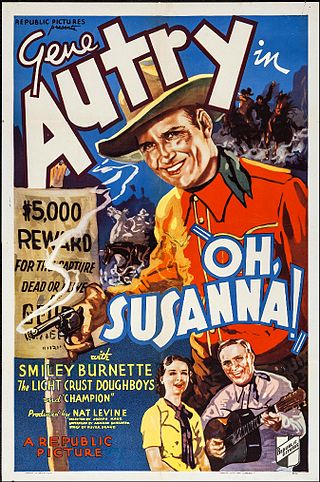
Oh, Susanna! is a 1936 American Western film directed by Joseph Kane and starring Gene Autry, Smiley Burnette, and Frances Grant. Written by Oliver Drake, the film is about a cowboy who is robbed and then thrown from a train by an escaped murderer who then takes on the cowboy's identity.

Public Cowboy No. 1 is a 1937 American Western film directed by Joseph Kane and starring Gene Autry, Smiley Burnette, and Ann Rutherford. Based on a story by Bernard McConville, the film is about a singing cowboy who chases down rustlers who are using airplanes, shortwave radios, and refrigerated trucks to steal cattle.

Down Mexico Way is a 1941 American western film directed by Joseph Santley and starring Gene Autry, Smiley Burnette, and Fay McKenzie. Based on a story by Dorrell and Stuart E. McGowan, the film is about a singing cowboy who comes to the aid of the townspeople of Sage City who are victims of a nefarious scam.
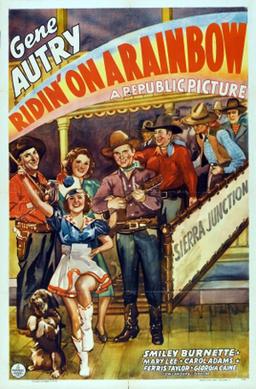
Ridin' on a Rainbow is a 1941 American Western musical film directed by Lew Landers and starring Gene Autry, Smiley Burnette, and Mary Lee. Written by Bradford Ropes and Doris Malloy, based on a story by Ropes, the film is about a singing cowboy whose investigation of a bank robbery takes him to a showboat, where he finds that a teenage singer's father has been working with the robbers to provide for her future. The film received an Academy Award nomination for best original song for "Be Honest with Me".
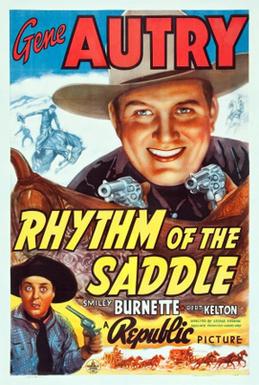
Rhythm of the Saddle is a 1938 American Western film directed by George Sherman and starring Gene Autry, Smiley Burnette, and Pert Kelton. Written by Paul Franklin, the film is about the foreman at a ranch owned by a wealthy rodeo owner who will lose her rodeo contract unless sales improve.

The Singing Vagabond is a 1935 American Western film directed by Carl Pierson and starring Gene Autry, Ann Rutherford, and Smiley Burnette. Written by Oliver Drake and Betty Burbridge, the film is about a cowboy who rides to the rescue when badguys kidnap a beautiful woman.
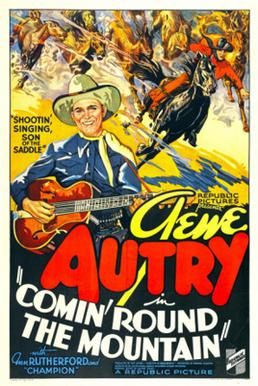
Comin' Round the Mountain is a 1936 Western film directed by Mack V. Wright and starring Gene Autry, Ann Rutherford, and Smiley Burnette. Based on a story by Oliver Drake, the film is about a Pony Express rider who is robbed and left to die in the desert, where he is saved by a wild horse he captures and later uses to round up other horses to be used in the race for a government contract.

The Singing Cowboy is a 1936 American Western film directed by Mack V. Wright and starring Gene Autry, Smiley Burnette, Lois Wilde and Lon Chaney Jr. Based on a story by Tom Gibson, the film is about a cowboy who decides to sing on television in order to raise money for the orphaned daughter of his former boss who was murdered.

Rootin' Tootin' Rhythm is a 1937 American Western film directed by Mack V. Wright and starring Gene Autry, Smiley Burnette, and Armida. Based on a story by Johnston McCulley, the film is about two cowboys who assume the identities of dead outlaws in order to stop a bunch of cattle rustlers, later discovering that the outlaws are far from dead.
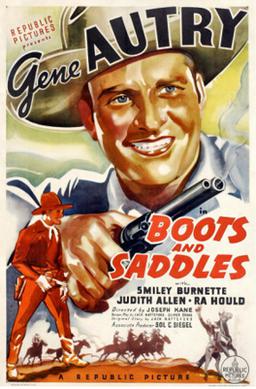
Boots and Saddles is a 1937 American western film directed by Joseph Kane and starring Gene Autry, Smiley Burnette and Judith Allen. It was produced and distributed by Republic Pictures. Based on a story by Jack Natteford, the film is about a young Englishman who inherits a ranch that he wants to sell, but is turned into a real Westerner by a singing cowboy.

Mountain Rhythm is a 1939 American Western film directed by B. Reeves Eason and starring Gene Autry, Smiley Burnette, and June Storey. Based on a story by Connie Lee, the film is about a cowboy who organizes his fellow ranchers to oppose an Eastern promoter's land grab scheme.
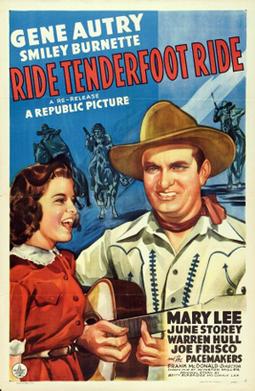
Ride, Tenderfoot, Ride is a 1940 American Western film directed by Frank McDonald and starring Gene Autry, Smiley Burnette, and June Storey. Written by Winston Miller, based on a story by Betty Burbridge and Connie Lee, the film is about a singing cowboy who inherits a meat-packing plant and must face stiff competition from a beautiful business rival.

Carolina Moon is a 1940 American Western film directed by Frank McDonald and starring Gene Autry, Smiley Burnette, and June Storey. Based on a story by Connie Lee, the film is about a singing cowboy who comes to the aid of plantation owners who are being robbed of their land by a scheming lumber company.
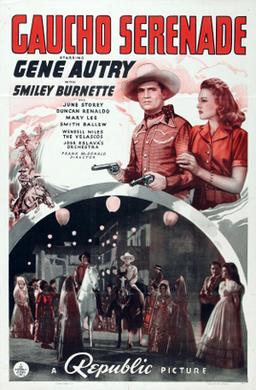
Gaucho Serenade is a 1940 American Western film directed by Frank McDonald and starring Gene Autry, Smiley Burnette, and June Storey. Written by Betty Burbridge and Bradford Ropes, the film is about a singing cowboy who goes up against a group of businessmen who plot to kidnap the son of a former partner so he won't testify against them.
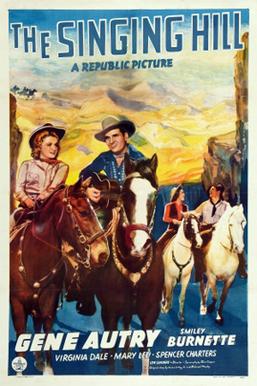
The Singing Hill is a 1941 American Western film directed by Lew Landers and starring Gene Autry, Smiley Burnette, and Virginia Dale. Based on a story by Jesse Lasky Jr. and Richard Murphy, the film is about a singing cowboy and foreman of a ranch that may be sold to an unscrupulous banker by the young madcap heiress who is unaware that the sale will result in the local ranchers losing their free grazing land and their ranches. In the film, Autry performed the 1940 song "Blueberry Hill", first recorded by Sammy Kaye, which would become a standard recorded by such artists as Louis Armstrong (1949), Fats Domino (1956), and Elvis Presley (1957). The song became one of Autry's best-selling recordings. In 1987, "Blueberry Hill" received an ASCAP Award for Most Performed Feature Film Standards on TV.

Home in Wyomin' is a 1942 American Western film directed by William Morgan and starring Gene Autry, Smiley Burnette, and Fay McKenzie. Based on a story by Stuart Palmer, the film is about a singing cowboy who helps out a former employer in trouble with his failing rodeo while romancing a woman reporter. In Home in Wyomin', Autry sang his hit songs "Be Honest with Me", "Back in the Saddle Again", and "Tweedle O'Twill", as well as Irving Berlin's "Any Bonds Today", becoming the first major star to sing the official song of the U.S. Defense Bond campaign during the war.

Call of the Canyon is a 1942 American Western film directed by Joseph Santley and starring Gene Autry, Smiley Burnette, the Sons of the Pioneers, and Ruth Terry. Based on a story by Maurice Rapf and Olive Cooper, the film is about a singing cowboy who leads a group of cattlemen against the corrupt agent of a large packing company looking to swindle them by undercutting the buying price for beef. The film features three songs by Autry and the Sons of the Pioneers, including the classic "Take Me Back to My Boots and Saddle".

Bells of Capistrano is a 1942 American Western film directed by William Morgan and starring Gene Autry, Smiley Burnette, and Virginia Grey. Written by Lawrence Kimble, it is a story of a singing cowboy who helps out a beautiful rodeo owner when her competitor gets too rough. The film features the popular songs "Forgive Me", "At Sundown", "In Old Capistrano", and "Don't Bite The Hand That's Feeding You". Bells of Capistrano was Autry's final film before entering the service for World War II.




















